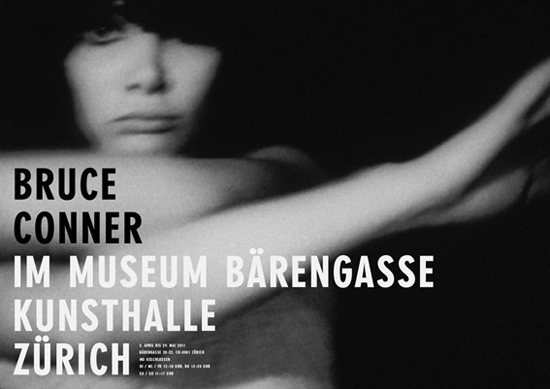
Bruce Conner, still from "Breakaway," 1966. 16mm, b&w/sound, 5 minutes.*
Kunsthalle Zürich at Museum Bärengasse Bärengasse 20-22 8001 Zurich Suisse
To an alternately rousing and poignant soundtrack, Indians chase a stagecoach and a tightrope walker balances on a wire above a city—these images feature in the found footage masterpiece A MOVIE (1958), an assemblage of newsreel images and film clips that established the reputation of American artist Bruce Conner (1933–2008). Today, Conner is viewed as one of the pioneers of the music video. Based on his experimental films, he is also mentioned in the same breath as Stan Brakhage, Jack Smith, Jonas Mekas and Andy Warhol as part of the avant-garde of independent American filmmaking.
Diversity is the hallmark of Conner's work and it is also reflected in his multiple careers and manifold identities. Drawings, collages, sculptures, assemblages, paintings, prints, photographs and films are just as much a part of his oeuvre as his conceptual, ephemeral, destroyed and lost—"invisible"—works. Conner explored topics like identity, biography and authorship with a critical and humorous touch, and constantly evaded artistic, personal and marketable categorisation: in 1967 he ran as a candidate for the Board of Supervisors in San Francisco (BRUCE CONNER FOR SUPERVISOR), he substituted a thumb print for the artist signature in a series of his works, he explored the question "Who is Bruce Conner?" by tracking down his namesakes throughout America, he planned a convention in 1964—for which, among other things, he designed and produced the I AM BRUCE CONNER and I AM NOT BRUCE CONNER badges—and even adopted the name of his friend, the actor Dennis Hopper, as a pseudonym (THE DENNIS HOPPER ONE MAN SHOW). He also had himself declared dead in the reference work Who was Who in America in 1973.
Having gained renown in the 1950s for his assemblages of nylon stockings, furniture components and other found objects, in the late 1960s Conner produced drawings and paintings, which were increasingly characterised by a narrative density and optical overloading that culminated in the emergence of a lyrical formal idiom in the 1970s. Abstraction is expressed through symbols of the metaphysical and transcendental. Motifs that present possibilities for the representation of the numinous or unconscious are presented in his inkblot drawings, mandala-like forms, images composed of innumerable white dots on a black background, the series of black drawings with their characteristic style and the engraving collages.
The exhibition at the Kunsthalle Zürich presents a selection of Conner's film works which, in addition to BREAKAWAY, also include CROSSROADS (1976), a film based on the documentary film recordings of the nuclear tests in Bikini Atoll, and MARILYN TIMES FIVE (1968–1973), a soft porn film from the 1940s in which a topless Monroe look-alike alternately holding an apple and Coca-Cola bottle in her hand flirts with the camera to a soundtrack of the song I'm Through with Love. The show also includes the similarly conceived and realised films TAKE THE 5:10 TO DREAMLAND (1977) and VALSE TRISTE (1979), which lure the viewer into a sepia-steeped dream world. Conner saw his films as extensions of music and produced music clips for punk-style bands like Devo and for Brian Eno and David Byrne's experimental art-funk project My Life in the Bush of Ghosts, which can also be seen at the exhibition.
The Bruce Conner exhibition at the Kunsthalle Zürich was organised in collaboration with the Kunsthalle Wien where the show "Bruce Conner. The 1970s" was curated by Barbara Steffen and Gerald Matt and with Ursula Blickle Foundation where the show "I AM BRUCE CONNER. I AM NOT BRUCE CONNER" was curated by Gerald Matt. The exhibition at Kunsthalle Zürich is curated by Beatrix Ruf in collaboration with Rahel Blättler. The selection of cross-media works presented – the exhibition includes over 100 works including drawings, oil and acrylic paintings, lithographs, photograms, photographs and a selection of Conner's films – illustrates the formal-aesthetic parallels between Bruce Conner's work as a visual artist and a filmmaker.
Kunsthalle Zürich would like to thank: Präsidialdepartement der Stadt Zürich and LUMA Foundation

